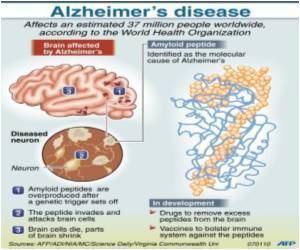Early-onset Alzheimer’s disease can be identified by a ‘cognitive reserve’, discovered researchers at the Mayo Clinic in Rochester, Minn. , and PET-CT examinations can identify the disorder.

Using earlier PET-CT examination results, the researchers identified significant abnormalities in patients with early-onset AD. This becomes important in the diagnosis of younger patients as Alzheimer’s dementia is usually not suspected in a younger age group.
The discovery of the "cognitive reserve" will help patients to cope and improve the quality of their lives with a proper diagnosis. “Once the diagnosis is determined, a patient can begin to manage the disease and plan for the future," stated Dr. Hodge who will present the study on May 2, 2011 at the 2011 ARRS Annual Meeting at the Hyatt Regency Chicago.
Source-Medindia








